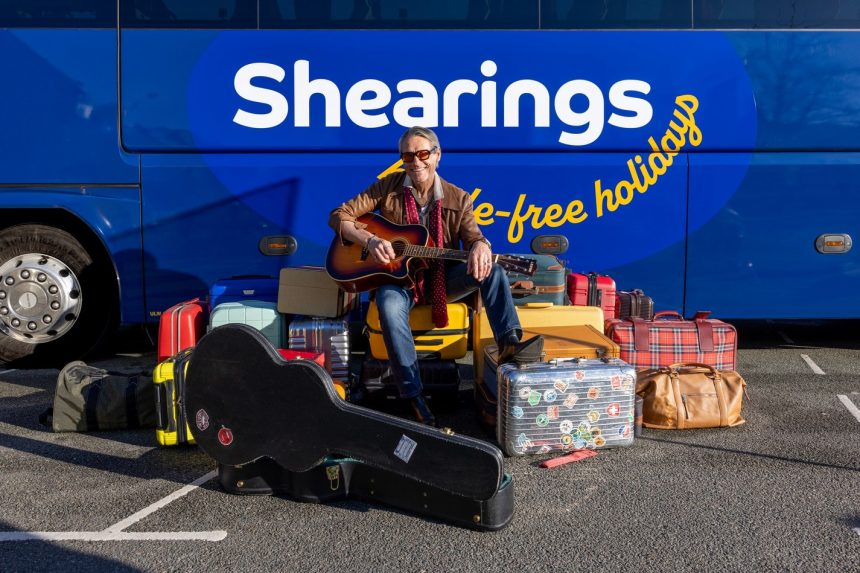In December 2024, Leger Shearings Group introduced a rebrand of the Shearings identity. But this was no ordinary rebrand. A neuromarketing study provided the impetus for a ‘brave’ new tone of voice and messaging
In June 2020, Leger Holidays bought the Shearings brand and assets, including the database. Four weeks later, a new Shearings brochure and website were launched. But apart from a few minor branding tweaks here and there, the ‘old’ Shearings look was maintained, a situation that continued through to early 2024.
“At the end of the COVID-19 pandemic we were growing at such an exponential rate we didn’t really have time to consider how we were positioning Shearings as a brand,” explains Liam Race, Chief Executive of Leger Shearings Group (LSG). “But as time moved on, we began to consider where the brand needed to go. Shearings, founded in 1919, has gone through various iterations of branding. We felt it was now our time to add our stamp on the brand.”
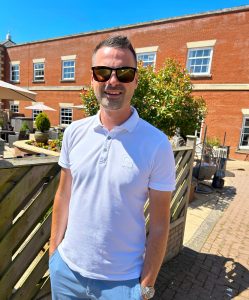
In February 2024, Liam and the LSG team started the journey that culminated in last December’s rebrand.
“We began with a traditional online survey of 10,000 people on the Shearings’ database,” says Liam. We identified six customer segments, from those who had travelled with the old Shearings but had never travelled with us since we acquired the brand, through to people who had enquired but never booked. We asked questions about their travel plans, their views on travel and about Shearings, and then what they felt about the brand and marketing.
“However, the key thing about people in general is that 95% of the purchase decision takes place in the subconscious mind and is unverbalized. So, when you do a survey or ask someone something, you’re only really getting 5% of the truth. A lot of people tell you what they think you would like to hear. I felt that we should try something different.”
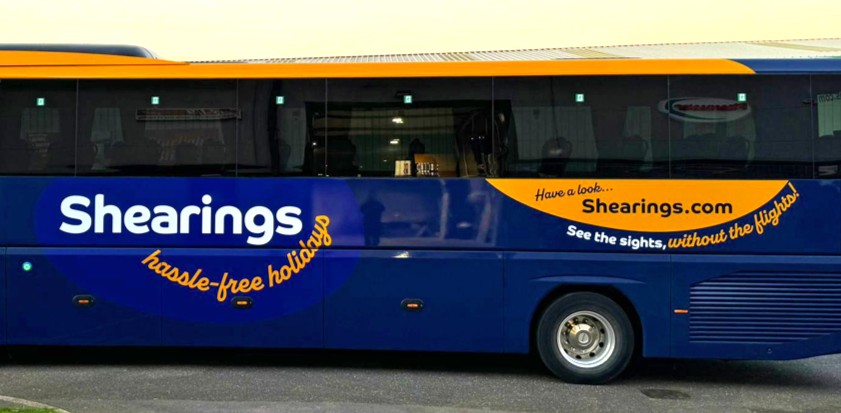
Tapping into the brain
In order to really understand what people felt about the brand, LSG conducted a neuromarketing study.
“We invited 41 people to the office and carried out an EEG (electroencephalogram) study that recorded the electrical activity in the brain,” explains Liam. “We split the 41 into four customer segments, showing them 62 separate pieces of content. This included our TV adverts and those of our rivals, tour operator logos, existing Shearings marketing, and some proof-of-concept marketing. We received and gathered up 53 million pieces of data, all readings from the brain. There was a total of 1.3 million data points from each participant.”
Liam notes that before the research began, the whole of the coach touring market had created what LSG now describes as a ‘land of indistinction’.
“The industry generally looked at place, product and price,” he says. “Our neuro research findings opened our eyes, suggesting there was an opportunity for us to shift away from all of that and introduce a clear differentiation gap. The message was clear: customers want a hassle-free holiday. When we presented some of our conceptual tag lines we could see that the hassle-free holidays wording gave the strongest brain responses for excitement and interest.”
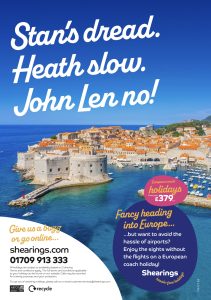
‘All the sights, without the flights’
“We developed a new strapline: ‘hassle-free holidays’. But it was important that we followed this through, so that means we say it, own it, live it, and prove it. Of course, the hassle-free promise only covers aspects of the product that we can commit to. We’re not going to say there will be no delays at Dover because we can’t do that. What we can say is that there’ll be no driving, no parking, no flying, no lugging your luggage, no overseas call centres, and no medical screening when you take out our insurance. These are things we can promise that we will deliver. And all of this is being communicated in a language that’s different. For example: ‘See the sights, without the flights’.
“We also looked at using a softer language within our copy and brochures. We were talking a lot about features and not enough around benefits. So, there’s been a big shift there in language and tone of voice. Wording such as ‘our drivers’, ‘fully escorted coach holidays’, ‘travel with an award-winning company’ has gone. We’re creating energy with a playful tone of voice and really differentiating ourselves from our rivals in a way you don’t see anywhere else.”
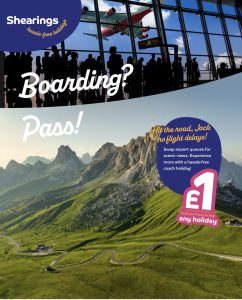
The rock star approach
A key visual element of the new marketing approach has been a television advert broadcast at the start of this year.
“The research showed that we needed a new TV creative that would increase unprompted brand awareness as well as improving brand awareness in general,” says Liam. “The advert opens showing an older musician, a rock star if you will. The viewer is engaged, not knowing what the advert is about. The musician is playing his guitar against the side of the coach, but what’s going on? The messaging comes through. The rock star was touring in the ‘80s but ‘touring’ today is a whole different world. The concept or thought of touring isn’t what the viewer may think. It’s very different, it’s much more modern, it’s much more comfortable, and we take care of everything. The ‘roadie’, who turns out to be the coach driver, lugs the luggage. The advert addresses the misconceptions of coach travel. Much like we did with the Leger TV advert in 2022, taking a holiday by coach is a lot better than people think.”
Enthusing the team
LSG says the response to the advert has been extremely positive with great feedback from customers old and new.
“We were confident it would be received well, with both old and new customers, because the neuro research told us that it would,” says Liam. “We used science and data to make a really clear, informed decision.”
Liam notes that what is undoubtedly a first in coach tourism marketing doesn’t stop there.
“It’s important when you transition a brand that you don’t just make the change and put your feet up. The risk is you slip back into the old world. To enthuse our team we held an open afternoon for staff on 19 December to launch the rebrand. We brought a rebranded coach to the office car park, premiered the TV advert and changed the large end wall in our contact centre to show the new messaging. We’re also talking with our coach drivers because you can’t say you’re promising to do something and don’t deliver.”

Operator relationships
Chris Plummer, LSG’s Chief Product Officer, explains that driver training is a really important element of the relationship with its contracted coach operators.
“We work with 11 key coach operators and a wider total of around 30,” he explains. “Our driver training is highlighting what’s different and how the brand has changed. In the last month we have held dedicated focus meetings bringing together 40 of our most experienced drivers. This is in addition to our driver training sessions involving 110 drivers. These sessions ensure they are fully
briefed on our expectations, with a focus on customer experience. It’s so important as our drivers are ambassadors for the brand. Those relationships are very strong. At our recent operator awards,
six operators were recognised for having over 20 years’ service with Leger/LSG.”
Reducing the age profile
Liam notes that despite sales being positive, the current coach holiday market is not without its challenges.
“Sales for our Leger and Shearings continental products remain very strong but there’s a slight dip in demand for domestic tours,” he says. “Our research indicates that the UK’s economic situations and world politics is affecting customer confidence.”
Liam explains that a similar neuromarketing study for the Leger branding will take place in 2026.
“With the Shearings research we knew the results would likely prompt a slight shift in terms of tone of voice, and a minor nudge in terms of a rebrand. But when we received the neuromarketing results it gave us the confidence to be much braver than we would otherwise have been. The route we’ve gone down would probably not have been a move we would have made otherwise. Looking back, if we had just made a slight tweak we wouldn’t have made enough of a differentiation gap. So, what we’ve done is certainly a very bold move, but one we’re very confident is paying off. We’ve gone further than we anticipated we would, but we’re extremely pleased with the results. The target audience for coach touring has consistently been 55 plus, with certain segments being 65 plus. So, I’m optimistic that the vibrancy, the tone of voice, and the dispelling of the misconceptions of coach travel, should organically result in a lower target audience age. Perhaps down to 50 plus. That will be good for us, and the benefits will be felt across the industry. It’s early days but the signs are there. The team has done a great job.”





















